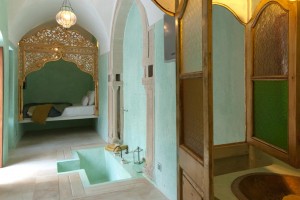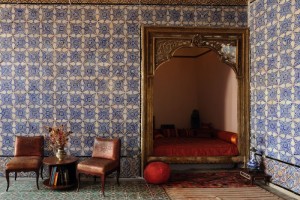Traders sell dried jasmine and harissa spices. Tourists gaze up at rows upon rows of fine leather handbags. Men clutching prayer mats stream through Nabeul’s busy medina towards the mosque, as the tuneful cry of the muezzin echoes through the souk. The heat of the day is waning, and I slip away from the crowds and head for a skinny side street where children play outside brightly-painted windows. Pushing open a nondescript wooden door, I breathe a sigh of relief. Nabeul is a pretty city, but there’s something much better on the other side of the doorframe: Dar Sabri, Tunisia’s first dar hotel.
Dar hotels are Tunisia’s answer to the Moroccan riad; resplendent conversions of traditional family homes, palaces, or buildings centered around a communal courtyard. Larger than guesthouses but smaller and more personal than boutique hotels, the dar is the hip young thing in Tunisia’s tourism industry. The Belgian-Tunisian designer Sabri Oueslati launched the trend six years ago, when he transformed a former home and pottery factory into a sleek, stylish dar hotel with a rooftop pool. Since then, dar hotels have been popping up all over Tunisia – tucked inside medinas, perched on clifftops, or shoulder-to-shoulder with desert oases.
I meet Sabri, as luck would have it, in the courtyard of his eponymous hotel. Like the hotel itself, he is handsome with great sartorial style; his crisp white shirt, well-cut jeans, and bare feet say as much about the hotel as its whitewashed walls, cuboid pool and red mud hammam. “I wanted to create a space that had a lounge feel to it,” he tells me, pointing out the bubbling rosewater pond that sits in the center of the courtyard. Architecture magazines spill onto coffee tables,and after dark, a soundtrack of soft African jazz kicks in. Each room has its own personality; the Gold Suite has a big sunken bath for two and a bathroom hidden behind gold leaf work.
The appeal of the dar hotel, Sabri tells me, is that everything is concealed behind a discreet wooden door. Unlike other guesthouses and upmarket hotels, there are no exterior indications of what lies inside. Dar Sabri’s door is simple and wooden; ringing the bell for the first time, you catch yourself wondering if you’re even in the right place. But other dar hotels have different kinds of doors. Over at Dar Fatma in the chic seaside village of Sidi Bou Said, the door is studded with Berber ironwork. And at Dar Hassine Allani in the holy city of Kairouan, the hand of Fatima — a symbol of Islamic faith — graces the tall, curved wooden panels.
In Nefta, a desert town in far eastern Tunisia, the concept of the dar hotel has been taken a step further. Guests at the Dar Hi hotel can interact with their environment in a different way, choosing a specific vibe — such as city, desert or oasis — each one blessed with a relevant relaxation space: terrace, pool, or hammam. In traditional dars, family members of varying ages each had their own space but came together in the central courtyard. At Dar Hi, guests with different interests can escape to their preferred worlds but always have the option of meeting others in the communal spaces and restaurant. There are three kinds of accommodation: pill houses, troglodyte cave houses with circular living spaces, and wind-sculpted dune rooms.
But no matter how sleek the rooms or how stylish the surrounds, a dar hotel is not designed to be a hideaway. “In many ways, dar hotels are more representative of Tunisian culture than any other place you’ll visit,” says Mohammed Fethi, a tour guide from Tunis. “There are hotels and isolated resorts for people who want to leave the world behind,” he says. “But if you stay in a dar hotel, you interact with other guests and staff in the way you would if you were part of their family. You don’t spend all your time with them, but you see them in the courtyard and at the breakfast table. The beauty of dar hotels is that you have all the time in the world to yourself, but they don’t leave you anonymous.”
Three years after Tunisia’s revolution, tourism to the country is once again beginning to slowly rise. According to Tunisians employed in the tourism industry, the post-revolution era is attracting a new kind of tourist: those who want to engage with the country on a deeper level and understand its different faces. Dar hotels, then, with their communal spaces, rich history and varied facades, might just be the best place to do that.
Five hip dar hotels
La Chambre Bleue: Housed in a former 19th century palace, La Chambre Bleue is a dar guesthouse that brings together buildings once used for housing princes, slaves and ancient guests. Owners Sondos and Marwen have transformed it into a hip dar hotel with sumptuous alcove beds and spectacular gold ceilings. Guests come together for delicious, shared breakfasts in the courtyard nook. (Tunis medina; +216 2257 9602; from Eur70 per room)
Dar Sabri: Sabri Oueslati’s sleek creation combines the charms of the former pottery warehouse and home it sits in with a fresh, stylish, luxurious design. Some rooms feature rain-effect showers and sunken bathtubs, while the communal areas stretch to a rooftop space, mud-and-steam hammam and a cuboid swimming pool. (Nabeul medina; +216 72 272 877; from Eur100 per room)
Dar Fatma: High above the rocky beach at Sidi Bou Said, Dar Fatma is a whitewashed, windblown dar with curved bathrooms and snug sleeping quarters. Breakfast is served in the communal courtyard, while up on the roof, guests sink into the hot tub or catch rays beneath the big blue sky. (Sidi Bou Said; +216 25 246888; from Eur90 per room)
Dar Hi: Eco-lodge, hip hotel and traditional dar at once, this desert dwelling combines the sleek vibe of city living with the silence of sand dunes and the splash of warm water. Staying here is a constant game of Choose Your Own Adventure; pick and choose the luxury aspects that suit you best. (Nefta, Sahara Desert; from Eur270 per room)
Dar Dhiafa: Plump sun loungers surround a terracotta dipping pool at Dar Dhiafa, the most stylish place to sleep on the desert island of Djerba. The turquoise wooden doors hide vintage furnishings, luxurious mosaic dens and serene bedrooms you’ll never want to leave. Candlelit corridors link the rooms, leading out to the beautiful courtyard and terraces. (Djerba; +216 2257 9602; from Eur70 per room)


